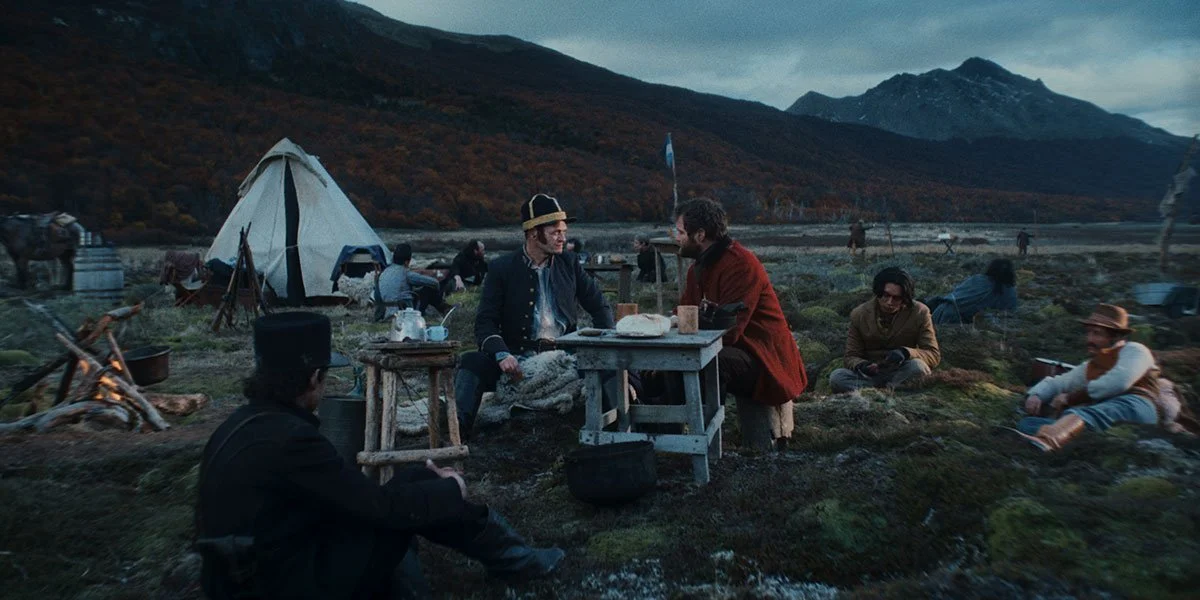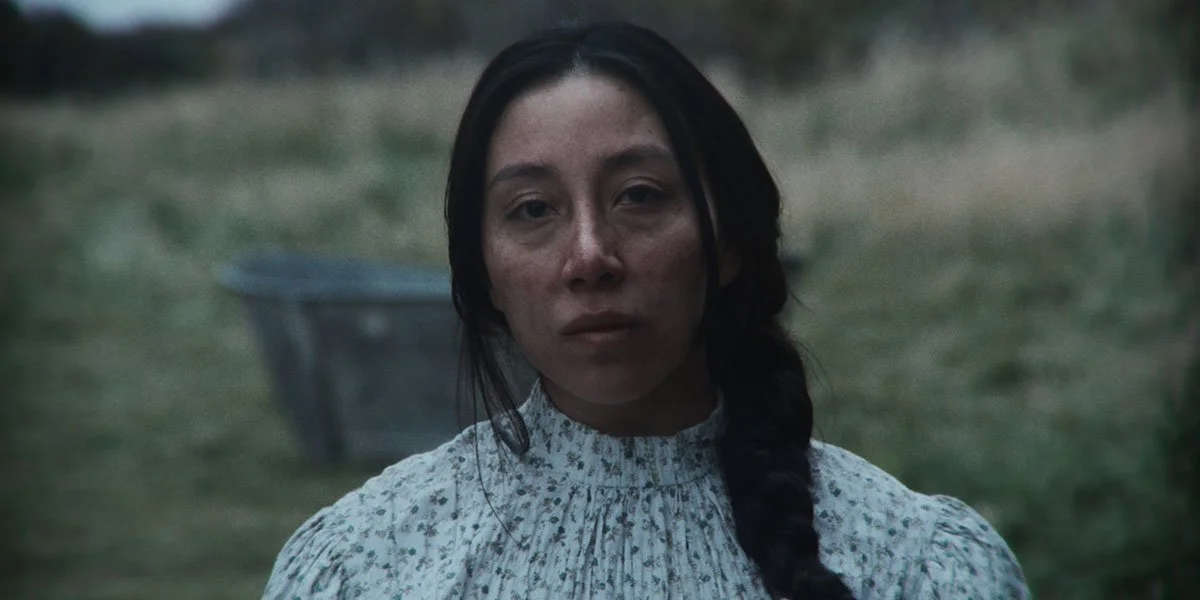'The Settlers' Review: A Brutal Portrait of Chile's Not-So-Distant Colonial Past
Courtesy of TIFF.
Felipe Gálvez's debut feature, The Settlers, examines the blood-stained roots of Chile's nation-building efforts, exposing the brutal actions of a budding country on its way to "civilization" as understood by Western societies. Veering away from the typical 17th-century colonialization narratives often portrayed on screen, The Settlers takes place in the early 20th century in the Chilean archipelago of Tierra del Fuego, the southernmost tip of South America, centering around a hodgepodge of men deployed to rid a wealthy landowner's territory of its Indigenous populations of Selk'nam people, known in the film as the Ona. Through this fierce cinematic interpretation of Chile's actual history, Gálvez's first film illuminates a dark chapter in the country's past that most choose to ignore. Visually and narratively ambitious in form, The Settlers is one of cinema's most searing explorations of colonial power in recent memory.
Beginning in 1901, The Settlers opens with a breathtaking widescreen shot of Patagonia's rolling hills, where men are hard at work fencing off the territory borders for a wealthy landowner and businessman, José Menéndez (Chilean star Alfredo Castro), a real-life figure with significant stakes in the area during the time. A Scottish laborer is swiftly executed after losing his arm in a freak accident, unquestionably setting the scene for an era in Chilean history when bodies were treated as a means of production and commerce, nothing else. A "big wig" under Menéndez is Alexander MacLenan (Mark Stanley), a former high-up in the English military, tasked by his boss to rid this land of all Indigenous presence. For the mission, MacLenan brings along the sharp-shooting Segundo (Camilio Arancibia), a young Mestizo man looking for work who hails from another island in the region. The last of their slaying squad is Bill (Benjamin Westfall), renowned for his violent tactics against the Indigenous populations in his native Texas. Together, this trio of men traverses the lands on their atrocious assignment, unveiling their dissimilarities in perspective as they move along and exemplifying the true horrors of Chile's colonial past.
Courtesy of TIFF.
Shot by cinematographer Simone d'Arcangelo, The Settlers depicts a bold visual journey as its central characters make their way across the Tierra del Fuego, beginning with richly saturated colors and backdrops and gracefully moving toward a colder palette devoid of pigment as the movie's themes of violence play out on screen. At the film's height of brutality, when Segundo and his white commanders slaughter an Indigenous community in a frozen forest, there is a decisive shift in the film's visual language, leaving the rest of the movie to be washed in tones of grey and blue, taking away any sense of warmth in the aftermath of the tremendous cruelty.
Through the characters of Bill, MacLenan, and Segundo, Gálvez can confront and identify the pillars of force responsible for the repressive and genocidal actions that took place in modernizing Patagonia and, by extension, the entirety of Chile. Bill and MacLenan represent the facades of Manifest Destiny in different ways, with MacLenan's Scottish roots keeping him tied to concepts of the Old World, the original Imperialists, and Bill's Texas ties to that of budding American Imperialism. Their white perspectives distance them from the Indigenous communities they are destroying, keeping them from seeing any humanity in these civilizations with an inherent ignorance reminiscent of many colonial accounts. At one point, MacLenan tells Bill, "You're white, and he's not. And our differences are set in stone." While Segundo's Mestizo background is kept rather mysterious, it is plain that he has been subjugated to much injustice by those of European descent. One of The Settler's most involving emotional struggles is that of Segundo, as he is made complicit in the crimes against the Selk'nam people. Yet, his forced subservience to the higher-ups keeps Segundo powerless, creating a deep spiritual struggle for the young man caught between two worlds. While Chilean history does not serve the colonizers the consequences they deserve, Gálvez certainly does in this film...
Some may compare The Settlers to movies of the Western genre, but the film's historical fabric exists so far away from the traditional tales of the American West, making the film much more connected to Chile's uniqueness than any genre exercise. Unlike conventional Westerns, this film lacks any actual heroic figures, instead maintaining a hyper-focus on the perpetrators and the perpetrated. Gálvez also uses his mainly male subjects to make intriguing criticisms of masculinity in a time when men were sent to establish these colonial outposts before women and families entered the picture later. As a result, many of the male interpersonal relationships in the film are heightened struggles of power and force, as displayed in scenes when the men are arm-wrestling, boxing, (and most disturbingly) sharing the Indigenous women they have terrorized. This analysis of masculinity works well in connection to the larger picture of Imperialism in the film as a means of exercising authority and control.
Courtesy of TIFF.
The latter part of The Settlers shifts seven years into the future, to 1908, leaving behind the trio of men the narrative first focuses on and returning to civilization. At Menéndez's vast manor home, he is visited by Vicuña, a political representative from the capital of Santiago who wishes to bring to light the atrocities faced by the Indigenous populations on Menéndez's land in the past. The men meet and speak with a certain detachment from the crimes, portraying their shallow understanding of the violence in the territory. Vicuña seems like a savior at first, but when he heads to Segundo's new homestead to hear a first-hand account, it becomes evident that Vicuña wants to use his own political clout to shape the narrative of the Selk'nam genocide in a manner that works for the history he wishes to shape, denying Indigenous agency in the retelling of their own accounts. While this late portion of the film may seem motionless or sluggish compared to the thrilling opening, this piece speaks the most to contemporary Chile and the issues of erasure and avoidance that the country's higher-ups still utilize to tell their own history concerning Chile's not-so-distant collective trauma of the Pinochet Regime, which had its 50th anniversary on the of the film's TIFF premiere, September 11.
Overall, The Settlers speaks to contemporary cinema as a crucial spotlight on a moment of significant change and violence in the national DNA of Chile. Gálvez and his co-writer Antonia Girardi prove that their fearless perspectives need a voice to uncover truths about their own identities and that of an entire country. Through its tremendous ideas of violence and power, The Settlers showcases a history that should never be forgotten. After premiering at this year's edition of the Cannes Film Festival, where it was screened in the Un Certain Regard section and awarded the FIPRESCI Prize, the film was acquired for distribution rights in the United States and the United Kingdom by MUBI. Most recently, The Settlers was submitted by Chile as their country's bid for the Best International Feature race at the upcoming 96th Academy Awards.


